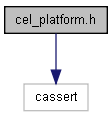Platform Definitions. More...
#include <cassert>
Include dependency graph for cel_platform.h:

This graph shows which files directly or indirectly include this file:

Macros | |
| #define | CEL_ENV_WINDOWS 0 |
| #define | CEL_ENV_CYGWIN 0 |
| #define | CEL_ENV_MACOSX 0 |
| #define | CEL_ENV_LINUX 0 |
| #define | CEL_ENV_SOLARIS 0 |
| #define | CEL_ENV_FREEBSD 0 |
| #define | CEL_ENV_AIX 0 |
| #define | CEL_ENV_HPUX 0 |
| #define | CEL_ENV_POSIX 0 |
| #define | CEL_RESTRICT |
Detailed Description
Platform Definitions.
Macro Definition Documentation
| #define CEL_ENV_AIX 0 |
If the platform is AIX, the value is 1, otherwise 0.
| #define CEL_ENV_CYGWIN 0 |
If the platform is Cygwin, the value is 1, otherwise 0.
| #define CEL_ENV_FREEBSD 0 |
If the platform is FreeBSD, the value is 1, otherwise 0.
| #define CEL_ENV_HPUX 0 |
If the platform is HP-UX, the value is 1, otherwise 0.
| #define CEL_ENV_LINUX 0 |
If the platform is Linux, the value is 1, otherwise 0.
| #define CEL_ENV_MACOSX 0 |
If the platform is Mac OS X, the value is 1, otherwise 0.
| #define CEL_ENV_POSIX 0 |
If the platform supports POSIX API, the value is 1, otherwise 0.
| #define CEL_ENV_SOLARIS 0 |
If the platform is Solaris, the value is 1, otherwise 0.
| #define CEL_ENV_WINDOWS 0 |
If the platform is Windows, the value is 1, otherwise 0.
| #define CEL_RESTRICT |
Assumes no alias of the pointer. It is almost identical to C99 restrict.
